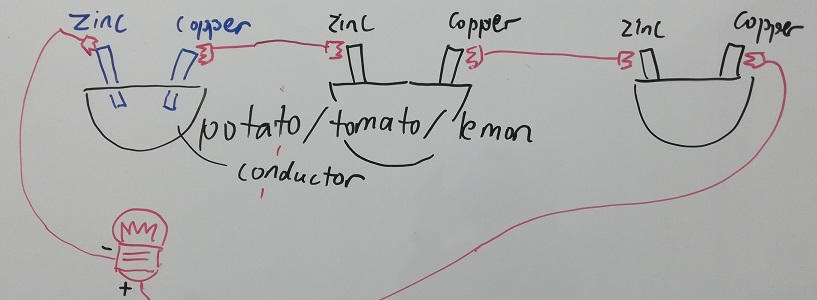What better way to ingrain in our Science students the application of Science in actual hands-on work!
The potato battery has been used in school experiments for a long time. While commercial kits are available, we decide to get our hands wet and dirty to make one from raw materials and bits and pieces of electrical apparatus as described a previous post.
Today, we revisit the potato battery and attempt to make one out of fruit/vegetable other than a potato.
Theory of Our Battery
For a good discussion of how a potato battery works, refer to our previous post which mentioned the Reactivity Series or Electrochemical Series. It also talked about the potato acting as an electrolyte to conduct an electric current within the battery.
For this experiment during our Science class, we repeated the use of a copper strip and a zinc strip as the electrodes. They are relatively cheap and easy to obtain and give good results.
This time round, we decided to use alternative electrolytes for our battery. Three common household foods were used – lemon, orange, tomato. For a control, the good old potato was thrown into the mix. (Not surprisingly, others had done similar experiments before. Read here for a different version of the Lemon Battery.)
Set-up of our Batteries


Results
- Lemon, Tomato and Orange work well as batteries compared to the venerable potato.
- Naturally, some work better than others. If you want to know about the ranking of the various fruits/vegetables as batteries, be sure to join our Primary Science Tuition Class, Lower Secondary Science Tuition Class or Chemistry Tuition Class to find out for yourself!
Learning Points from Battery Experiment
As in any Science hands-on work, discussion and reflection after the experiment are critical to the learning process of the students.
- Real life is often more flexible than you think. Become adaptable and you will realise that a Potato Battery need not be made from a Potato.
- Real-life work is likely to go through several or many iterations before it can work. Experimental work is a microcosm of real life. Do not expect something to work on the first try.
- Attaining success through failures is sweet. The look on our students’ faces upon lighting up the LED was priceless.
- To us, Science is more than just a subject. It is a mindset and a way to approach real problems in life.
Here at iMatter, we are firm believers that Science should best be learnt through practical applications and examples.
If you are interested in our Programmes, you can check out our Primary Science Tuition Class, Lower Secondary Science Tuition Class or Chemistry Tuition Class and Enrichment Programmes.

